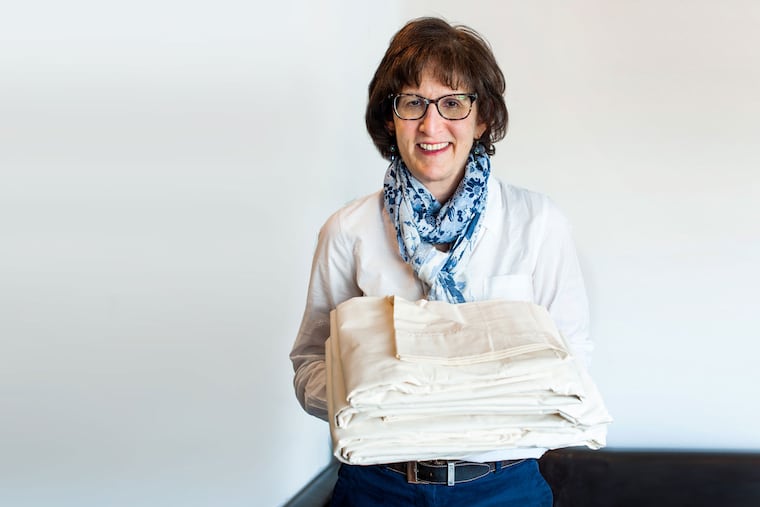American Blossom Linens sees business grow by 400% during pandemic
The sales uptick is driven in part by more people staying home, the CEO says. The Wyncote-based firm also emphasizes the organic cotton in its sheets and the fact that it is sustainably produced.

While businesses across the United States are reeling from the recession sparked by the COVID-19 pandemic, one family-owned linens business is thriving.
American Blossom Linens, the consumer-facing brand of the nearly 90-year-old Wyncote-based distribution company ATD-American, has seen its revenue jump by 400% since April. The brand, which was launched just last year, sells through its online store U.S.-manufactured sheets made from organic cotton grown in West Texas.
“I was surprised,” CEO Janet Wischnia said of the revenue increase. “People are being laid off, the economy is not so good, and I thought it would be tough right now.”
She attributes part of the uptick in sales to the fact that more people are staying home full time during the pandemic and might want to invest more in their living spaces. “People were trying to make their personal spaces a little bit nicer, and thinking about that for bedding, as well,” she said. “So it’s kind of like being in the right place at the right time.”
Wischnia notes that the sheets — a queen set including a flat sheet, a fitted sheet, and four standard pillowcases sells for $289 — are of higher quality than what’s typically available at big box stores. The brand emphasizes both the “farm-to-bed” nature of the fabric, as it writes on purchase thank-you cards, and the structure of the linens with thicker and more durable elastics.
American Blossom has also tried to appeal to younger consumers by emphasizing sustainable manufacturing practices. “They like the fact that it’s made from organic cotton, grown without pesticides, and finished in a chemical-free way,” Wischnia said.
But she thinks there’s an even bigger explanation for American Blossom Linens’ spike in sales. Wischnia says that as the orders started to flow in, she got more emails and Facebook messages from customers saying they wanted to prioritize buying American-made products. “When we saw a shortage of personal protective equipment and heard that China had a lot of it in April, I think it got people thinking that maybe they don’t want to buy as many products made in China anymore,” she said.
Elizabeth Brotherton-Bunch, who heads communications for the Alliance for American Manufacturing, says she’s noticed this trend, as well. “Consumers are being very deliberate about the money that they’re spending right now,” she said. “And they are trying to support locally made goods and American-made goods.”
Buying American-made products is important for more than just political reasons right now, Brotherton-Bunch notes. She describes every purchase of a product as a chain reaction that ripples through the rest of the economy. “When you buy an American-made product, you’re supporting a job in an American community,” she said. “And when that happens, we see the growth of indirect jobs around it.” Manufacturing, in particular, she notes, is an industry that often generates growth in other sectors, such as construction, accounting, or engineering.
Still, Brotherton-Bunch notes that most executives she’s spoken with haven’t seen as dramatic a revenue jump as has American Blossom. Having a strong e-commerce platform and well-established consumer relations before the pandemic are advantages she’s noticed among those that have found success over the last few months.
She’s worked with wholesale companies that raised sales by embracing a more consumer-facing approach. “We’ve seen companies begin to recognize that their wholesale sales aren’t going to be able to sustain them through this, so they’ve begun to really expand on trying to reach out to people in different ways,” she said.
Wischnia says that’s been the case, in some ways, for ATD-American. Before launching American Blossom Linens as a consumer-focused retail brand last year, ATD-American relied solely on wholesale revenue from buyers in the hospitality, health-care, and government facilities industries. “Then COVID came, and, of course, that was not so good for the hospitality business,” she said.
But having a year’s worth of practice in online retail made Wischnia more comfortable navigating sales and consumer relations during the pandemic. For digital advertising, she says, American Blossom has looked to social media. “We’re doing a little bit of everything, doing our own social media, using influencers, just trying to see what works,” she said.
Wischnia declined to disclose revenues. American Blossom had 70 employees working at the brand’s distribution factory in Thomaston, Ga., and 25 working from the Wyncote office at the beginning of this year. Those numbers haven’t changed during the pandemic, thanks to a Paycheck Protection Program loan, said Rachel Morales, a spokesperson for the company.
Wischnia thinks the company’s success also stems from the nature of its product. And while her product line remains somewhat limited, she plans to introduce new merchandise, including a sustainably dyed and manufactured blanket coming out later this year.
With the brand still so new and navigating an unprecedented economy for retail, Wischnia doesn’t know what to expect in the future but hopes she can keep bringing customers back with new products.
“I would think it’s going to be hard to keep growing at that rate,” she acknowledged. “But it would be great if we could.”